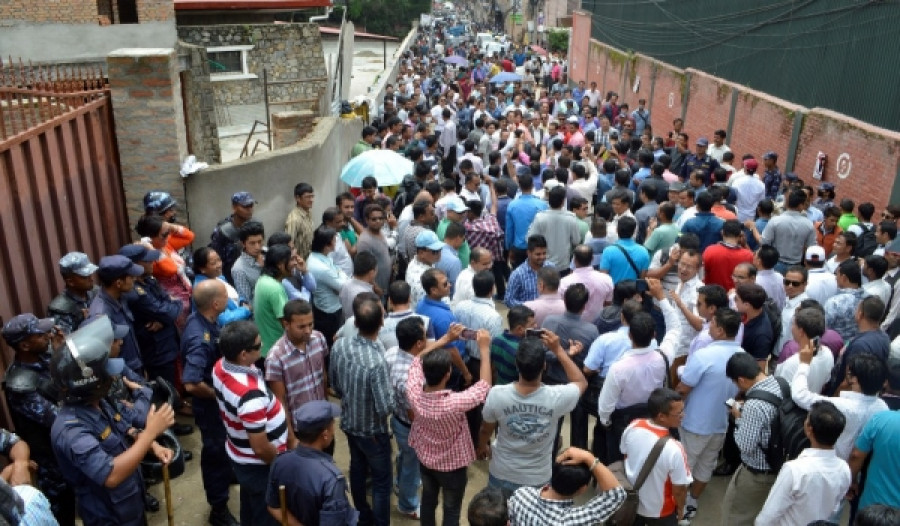National
Recruiting agencies and foreign employment bodies resolve conflicting issues
As per the understanding, recruiting agencies can set up a branch office in each province.
Chandan Kumar Mandal
Recruiting agencies that are engaged in hiring Nepalis to work for foreign employers will now be allowed to open their branch offices in all the seven provinces.
This is one of the agreements reached between recruiting agencies and government bodies overseeing the foreign employment sector.
With some understanding reached following a series of discussions between officials of the Department of Foreign Employment and the representatives of Nepal Association of Foreign Employment Agencies, the umbrella organisation of such agencies, the long-standing row between the two sides seems to have been resolved for now.
“Through several rounds of discussion, we have agreed on a number of issues,” Sujit Kumar Shreshta, general secretary of the foreign employment agencies’ association, told the Post. “Now, most of our concerns which were directly related to the department have been addressed.”
For the past several months, foreign employment officials and recruiting agencies had been in a confrontational mode over their conducts and activities. Last month, recruiting agency representatives demonstrated outside the Department of Foreign Employment at Buddhanagar and presented a list of 20 demands before the department.
One of the demands was allowing recruiting agencies to open their branch offices outside Kathmandu Valley. As per the understanding, all the recruiting agencies can set up one branch office in each province—seven in total across the country.
“There is a legal provision for agencies to open branch offices outside the Valley but this had not happened because of bureaucratic negligence. There will be new standards for operating such agencies,” said Shrestha.
“We are yet to see how many agencies will set up their offices in the provinces but agencies are eager and laws permit that. Also, authorised offices will help eliminate corruption that is happening through sub-agents.”
According to Shrestha, the office will have at least three staffers, with the chief having a minimum bachelor’s degree, but the branch office will not be permitted to do a financial transaction.
Tikamani Neupane, a spokesperson for the Department of Foreign Employment, agreed that the government would ease some processes for the recruiting agencies.
“Opening branch offices can give workers direct access to recruiting agencies, instead of sub-agents. And, even if 500 agencies open such branches, there will be hundreds of jobs at the local level,” said Neupane.
One of the most crucial issues between government bodies and recruiting agencies has been the monitoring of such agencies.
Following malpractices and complaints from migrant workers, department officials raid such agencies and also penalise them by deducting amounts from the guarantee deposited by agencies for securing the operating licence or by even suspending their licence. Recruiting agencies have expressed their dissatisfaction over such actions.
According to Shrestha, both sides have agreed to form a committee, consisting of department officials, representatives of NAFEA and the agency involved and the victimised migrant workers, which will jointly oversee grievances twice a week—on Sundays and Wednesdays.
The practice of keeping recruiting agencies’ representatives in the same committee for overhearing grievances of workers had been criticised in the past for it would hamper justice delivery to the migrant worker who files a complaint against such agencies.
The department official, however, said recruiting agencies’ representatives will not be called for the regular meeting unless required.
“When there are complicated issues, then only will the department call them. It’s not that they will be available for all meetings,” said Neupane. “The department will not ask them [recruiting agencies] about every action it takes.”
Other issues that have been resolved concern the advertisement of worker demands, cancellation of workers’ shortlist and keeping alternative workers’ list open.
As per the current practice, recruiting agencies have to re-advertise vacancies if the workers’ demand is not fulfilled.
“If the agencies did not get enough candidates for vacancies, then they had to re-advertise through newspapers. For example, if the demand is only for five workers and one worker does not agree to go, we’d have to do it all over again,” said Shrestha. “As the workers’ demand has two years of validity, we can send them later as well. Now after informing the department, agencies can advertise through their website or social media, not necessarily print media.”
Also, earlier, even if one worker among those selected in the group did not migrate, then the whole list of chosen workers had to be scrapped and the hiring process restarted all over. The provision was enforced as agencies could deliberately not select any candidate who would not agree to their terms or pay the demanded amount, during the interview.
While selecting workers as per the demand, the agencies had to adjust 25 percent alternative candidates.
“The worker who could not go [abroad] due to some reasons had to be present at the department and give his/her justification. It was not easy to find workers always. Now agencies can scrap the list but they should be responsible if any worker raises concerns and files a complaint,” said Shrestha.
“Occasionally, it would be difficult to put workers on the waiting list when the demand would be for a few. Now since the waiting list is open, even for the demand for five workers there could be 10 candidates on the waiting list.”




 9.7°C Kathmandu
9.7°C Kathmandu














